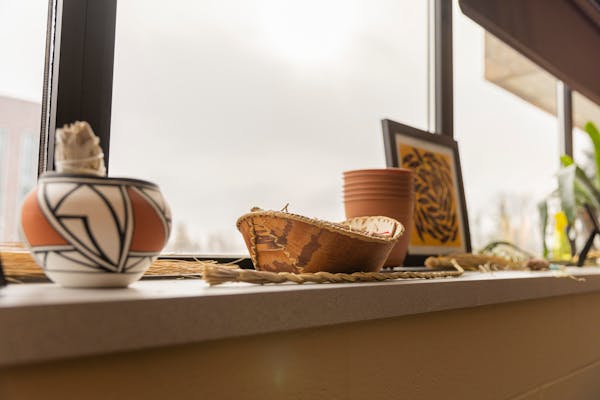José Hernández showed off a bag of dried yellow elder flowers from behind the counter of his Lake Street shop in south Minneapolis. "This one is good for diabetes," he said in Spanish.
Tronadora is one of the popular herbs that helped rescue Hernández's failing suitcase store. When the market for suitcases bottomed out with the COVID-19 outbreak, he took inspiration from his rural Mexican upbringing and shifted to selling medicinal herbs.
Now his store — called La Petaca, Spanish for suitcase — has developed a customer base. People come in requesting all types of herbs, and as demand has grown so has the range of Hernández's inventory. The shop fills a need among members of the Latino community looking for alternatives to traditional pharmaceuticals.
"The person comes here and asks you for a product and tells you what it's for, so you get the product and now you sell it to others," he said.
Hernández, 48, came to Minnesota undocumented from the Mexican state of Tabasco in 2003. He emigrated in search of a better life and to support his family in Mexico, he said, but Minnesota has since become home for him. He worked a variety of jobs until he gained his legal residency in 2018.
A year after he received his green card, Hernández started thinking about starting his own business. He was tired of working for others.
"In 2019 I was left jobless, so I started seeing what it takes to start a business," he said. "I was only going to focus on selling suitcases for traveling."
Advisors were skeptical, and organizations he asked for help told him it wasn't the right time to start a business. "Everybody would tell me, 'Don't do it,'" he said.
But Hernández pushed forward and opened his store at Plaza Mexico, 417 E. Lake St., in March 2020, just as the pandemic was taking hold. He soon was forced to shut down the store, then named J & B Alta Tendencia.
When he finally reopened, Hernández found that COVID had stifled travel so much that no one was buying suitcases. He had come from a small community where herbal remedies were used by his grandparents, mother, and neighbors to treat ailments like headaches, sore throats, and fevers. So he decided to capitalize on that knowledge and sell herbs instead.
The shop was in danger of shutting down again only a few weeks later, due to the civil unrest that erupted after Minneapolis police murdered George Floyd in May 2020. Protesters demonstrated for several nights on Lake Street, where the police department's Third Precinct headquarters was located, and several businesses were looted and burned.
Hernández's store, located about two miles west of the Third Precinct, wasn't hit, but merchandise was thrown out as neighboring vendor stalls were looted or damaged. Hernández, who doesn't like to discuss what happened, said what's important is that he was still able to work.
Most of his customers come from outside the Twin Cities and keep the business afloat, he said. Some travel from as far as North Dakota and South Dakota to stock up on medicinal herbs.
Hernández said there are good times and bad, as with any business. The shop, like many in Plaza Mexico, isn't fully stocked right now because vendors tend to offer fewer items during the start of the year to save money. The business is entering some of its slow months.
"There are days that nothing sells and others where we sell a month's worth," he said. But he added that it doesn't worry him, smiling and pointing upward: "He's who decides it all."
Earthy and floral scents permeate the small, packed space. The walls are lined with packages of dried herbs, vitamins and over-the-counter medicines from different Latin American countries. High on the walls above the herbs sit a few suitcases, a reminder of how the business came to be.
Hernández's limited English-speaking skills have limited his customer base, along with non-Latino shoppers who are unfamiliar with medicinal herbs and skeptical about their use as alternative medicines. But he said he's grateful to Minnesotans for giving him the opportunity to live his dream.
"Americans don't understand our customs — they can't comprehend how tea can lower blood sugar levels," Hernández said. "We don't know everything. But it can help, this medicine is a help."
This story comes to you from Sahan Journal, a nonprofit newsroom dedicated to covering Minnesota's immigrants and communities of color. Sign up for a free newsletter to receive Sahan's stories in your inbox.

Want to share info with the Star Tribune? How to do it securely

'Safe recovery sites' would offer syringes, naloxone and more to people using drugs. The plan could be in peril.
New Minnesota GOP leaders seek peace with party's anti-establishment wing

Who is Republican Lisa Demuth, Minnesota's first House speaker of color?

